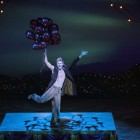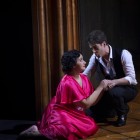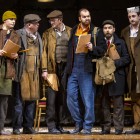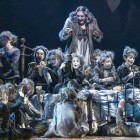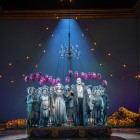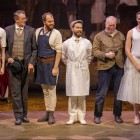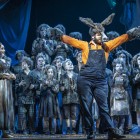Midsummer Night's Dream 2022Scottish Opera
Read more about the opera Midsummer Night's Dream
Britten's operatic adaptation of Shakespeare's wonderful comedy has had one previous staging by Scottish Opera. That was launched in 1972 and was performed frequently over the next few years, also being taken on several foreign tours. It was directed by Toby Robertson, who was known in Scotland as a leading interpreter of Shakespeare plays with the touring Prospect Theatre Company.
This second production was also entrusted to a leading theatre director who has plenty of experience with the classics. Currently (since 2011) director of the Citizens' Theatre in Glasgow, Dominic Hill previously ran the Traverse in Edinburgh, and before that Dundee Rep. With Scottish Opera he had already had success directing the Verdi/Shakespeare operas Macbeth and Falstaff.
This staging was highly successful, and at the final evening was greeted with wnormous delight by an audience that packed the Edinburgh Festival Theatre. Perhaps a sign of the times, many seemed to be unfamiliar with the plot. It was good to see so many young children enjoying what is actually quite a long opera.
The Orchestra of Scottish Opera was on excellent form under the baton of Stuart Stratford. The band seemed more numerous than in previous performances of this lovely work, but that may just have been the result of seeing it in smaller theatres. That 1972 production opened in Stirling before moving to Perth, and ETO brought it to the Perth Festival more recently ontwooccasions. Here we had a much larger band, but it was still well able to produce the wonderful eerie sounds so essential for depicting the living, breathing forest.
The main part of the set was a large framework, three sides of a cube, with reflective surfaces and a number of doors that opened for easy access. A Victorian-style bedstead made regular appearances, descending from onhigh. The large group of children, a mix of boys and girls, all sang clearly with excellent diction. Michael Guest, a recent graduate from the Conservatoire in Glasgow, was also wonderfully clear-voiced as an acrobatic Puck, who also had an athletic double for the rapid flying demonstrations. The Oberon and Tytania, Lawrence Zazzo and Catriona Hewitson, made an immediate impact with their strong vocal studies. The Fairy Queen's role, full of impressive coloratura display, is often difficult to understand. Here, however, every word was beautifully clear. Oberon presented a tall, elegant figure, well able to dominate his scenes.
The quartet of young lovers were nicely differentiated, the men in different coloured pyjamas, the womenmore formal. All four were now familiar from earlier company appearances. Jonathan Lemalu - Bottom in a student production twenty years ago - was luxury casting as Theseus, with Annie Reilly making a notable debut as Hippolyta.
The mechanicals were an excellent group of scene-stealers, from Dingle Yandell plumbing the vocal depths as Lion to Glen Cunningham's light and airy Flute/Thisbe. Jamie MacDougall's Snout introduced an effective link to old time variety.
In all an excellent evening.
The effects of Coronavirus
It was sadly inevitable that the handful of performances of this new staging in 2020, would fall a victim to the burgeoning threat of the Covid-19 (Coronavirus) pandemic that swept the world during the first quarter of the year, and continued through to the year-end and beyond. It was made clear on Monday, 16 March that all meeting places of any significance - pubs, restaurants, concert halls, theatres and opera houses - would be closed for a significant duration. Not only was the Dream cancelled, but also the subsequent productions of The Gondoliers and Utopia Limited. The concert performances of Cavalleria rusticana and Zingari also bit the dust. It is hoped that they will all be revived when the theatres reopen, with luck sooner rather than later.
The original schedule of six performances, all at 19.15, was: Tuesday 31/03, Thursday 02/04, Saturday 04/04 at Edinburgh Festival Theatre; and Tuesday 21/04, Thursday 23/04, Saturday 25/04 at Glasgow Theatre Royal.
Scottish Opera's 2019/20 Season
The season opened at the Edinburgh International Festival with the European premiere of Breaking the Waves by Missy Mazzoli. The autumn performances got under way with a visit to the Lammermuir Festival on 20 September with a single performance in concert of an unusual double bill - Mascagni's Zanetto and Wolf-Ferrari's Susanna's Secret. The Glasgow season opened with a welcome revival of Tosca. There was a Sunday afternoon concert of Iris, another rare work by Mascagni. In the New Year there was a new production of Nixon in China by John Adams. That was the point at which the curtain fell. As well as Britten's Midsummer Night's Dream. the losses included Sullivan's Gondoliers. Further concerts were to include a pairing of Mascagni's Cavalleria Rusticana with Leoncavallo's Zingari. There were also concert performances of a late Sullivan piece, Utopia, Limited, as well as the usual Opera Highlights tour of the Highlands and Islands.
At least the two Sullivan pieces, along with the Britten, were retrieved as soon as was practicable.
Performance Cast
- Puck Oberon's servant
- Tytania Queen of the Fairies
- Oberon King of the Fairies
- Lysander in love with Hermia
- Hermia in love with Lysander
- Demetrius in love with Hermia
- Helena in love with Demetrius
- Peter Quince a carpenter
- Snug a joiner
- Robin Starveling a tailor
- Francis Flute a bellows-mender
- Tom Snout a tinker
- Nick Bottom a weaver
- Theseus Duke of Athens
- Hippolyta Queen of the Amazons

